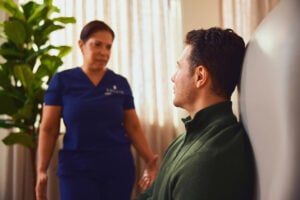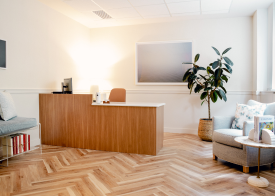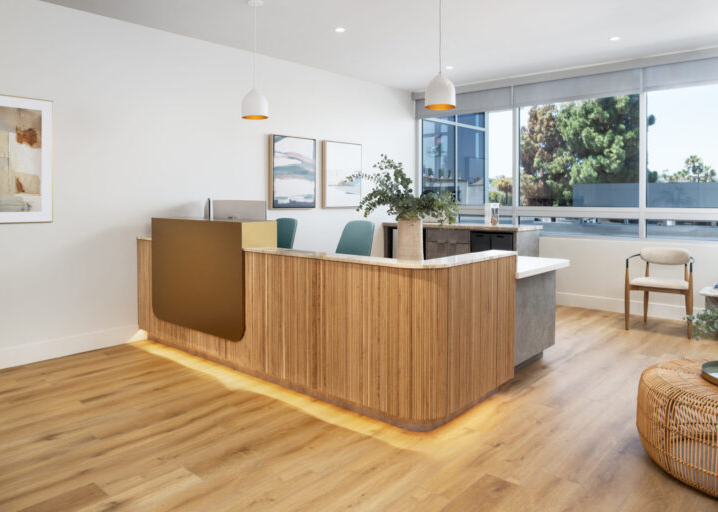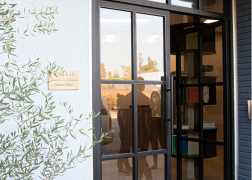How and when were you both diagnosed?
Erin: I was diagnosed on Sept 6, 2016. I was 39 years old, and the age people are supposed to start getting mammograms is 40. I mentioned to my gynecologist that I felt a little numb pain in my right breast and she suggested that I get a mammogram. Even though I didn’t think that it was necessary, it turns out that saved my life, because that mammogram was what ultimately led to the diagnosis of stage two breast cancer. It was a type called HER2-positive, which is a very aggressive, fast-growing cancer. Had I waited until I turned 40, it probably would have been much more advanced and my treatment would not have been as cut and dry.
Tom: I was diagnosed in October 2016. It started out with something as simple as swelling in my lower extremities that I played off to the fact that I had numerous injuries from playing sports in high school and college. Then there was blood in my urine, and that’s when I knew something was wrong. Essentially, I was initially diagnosed with something that closely resembled multiple myeloma. I had a monoclonal gammopathy of renal significance, but it’s sort of between myeloma and lymphoma.
What treatments did you undergo?
Erin: I did six rounds of chemo, including a targeted therapy called Herceptin. And then after that I stayed on Herceptin infusions for a full year. I also had a bilateral mastectomy with reconstruction. And I did 36 rounds of targeted radiation. And then a lot of therapy to deal with all the mental part of it, which is a whole other aspect of dealing with cancer.
Tom: I was put on a treatment plan that utilized three different drugs: Revlimid, which is basically oral chemotherapy, and injections of Velcade with a dexamethasone steroid.
How did you manage to stay positive when you were going through chemo together in your first year of marriage?
Erin: A lot of therapy. Prior to this, I always operated with the feeling that if you have good friends, you don’t need therapy. After finding a good therapist, I realized that’s definitely not true. In fact, most of my friends probably needed therapy too! In addition, having a good sense of humor and finding ways to allow ourselves to joke about the really dark things—things you probably wouldn’t necessarily say in public about cancer. We gave each other the permission and freedom to say those things with one another.
Tom: Our family was very key in helping us stay positive. And as messed up as this sounds, considering we both were going through something, we both had a deep understanding of what the other person was going through. So therefore, we could be there in ways I don’t think we really could have if it was just one of us going through it. The other thing was that we were very fortunate we had incredible medical care here in Los Angeles. When I was diagnosed, I didn’t know how long it was going to go. There was definitely a dark abyss I felt like I was staring into, but at least at the very bottom I knew we had really great medical care.
Can you share more on the collateral damage that you experienced after being diagnosed with cancer?
Erin: It was like this tsunami of one thing happening, which caused another thing to happen, which caused another thing to happen. I ended up getting an intestinal infection called C. diff, which usually only affects very old people because of their weakened immune system. And since I was neither old nor hospitalized, no one thought to say, “Hey by the way, if you have diarrhea for three weeks straight, and you can’t eat more than chicken broth without feeling like you’re going to be sick, there might be something wrong.” So I had diarrhea for three weeks, and lost 15 pounds I couldn’t afford to lose at the time. I used to joke it would be just my luck—I get cancer, but I don’t die of cancer, I die by s***ting myself to death. And then things like my toenails and fingernails falling off that no one prepared me for. You know, everybody talks about your hair falling out, but there are so many other things that happen to your body.
Tom: I think the biggest thing is that it’s still hard for me to talk about. As much as I’ve been through, I’m still not over it. I have to go in every other month to make sure it’s still in remission. I go into these appointments and there’s definitely 48 hours before and 24 hours after while I’m waiting for the test results to sit there and wonder, Is it back? I think it put me in a constant state of alert and fear. Having to put on this face like I’m OK, when secretly inside, I felt like I was crumbling. The hardest part is that no matter how much I try to cast it aside, or how much therapy I do, or how many times I talk to people, there’s this thing hanging over my shoulder. And for right now, it’s not going away. Adding to the collateral damage is the fact that when we got married, we were hoping to get pregnant and start growing our family as soon as possible. And immediately, before we even had a chance to learn what life was like for us as a couple, we were told, “Hey, you can’t start trying to have a family at least for several years.” So our hopes and dreams were put on hold. And of course by the time we finished treatment, the damage was so significant that we had no choice but to have a baby via surrogate, which we were very privileged and fortunate to have as an option, but obviously was not the way we would have chosen.
“I think it put me in a constant state of alert and fear. Having to put on this face like I'm OK, when secretly inside, I felt like I was crumbling.” (Tom)
Erin, you’ve said in the past that the term “cancer-free” is a misnomer. What do you mean by that?
Erin: I have multiple friends who went who had surgery or did some form of treatment and ended up later having breast cancer again. There was either some cancer in the incision line that they didn’t get or the cancer came back because one of those little cells attached itself to your liver and laid there dormant for 10 years.
The idea of somebody being cancer-free is to ignore the cancer that we live with on a day to day basis, which is the psychological cancer of going through that type of trauma. The only people I consider cancer-free are the people who haven’t had cancer. Once you’ve played Russian Roulette with your life, it’s hard to forget that trauma. It’s kind of like walking around with someone behind you pointing a loaded gun at your head. You just never know if it’s gonna go off again. I like to think that we will live very long, healthy lives. But I think once you’ve had to face something like that, there’s a feeling of, When is the other shoe gonna drop?
What advice do you have for people who are trying to bounce back from physical and/or emotional hardships?
Erin: Find a therapist, get in therapy.
Tom: Ask for help when you need it. Rely on your friends and your family. You’ll be surprised how many people step up way more than you think they ever could. And then just be good to yourself when you need to rest.
How did overcoming cancer give your life—and your relationship—a new sense of purpose? Is there anything surprising you learned about yourselves along the way?
Erin: We learned who was there for us and who we could count on. It strengthened relationships we didn’t realize were as strong as they were that we had maybe taken for granted. It also allowed us the freedom to walk away from relationships that were not supportive, that weren’t healthy for us. And I think the level of trust we have with one another—the level of honesty—there’s a bond we have that is unbreakable. That’s not something that can be faked. That’s not something that can be replaced. You know, every marriage goes through challenges and moments where people say the grass is greener, but for us, there is nothing, there’s no one out there for either of us who could even conceive of the fire we’ve walked through together. We also actually sat down and said, “Alright, if we’re going to have a kid, it’s now going to take a lot of time, it’s gonna be really emotional, pretty f***ing painful, and it’s gonna cost a hell of a lot of money. So why do we even want to do this?” And we really sat down and figured out why we wanted to have kids. And to be honest, most people don’t do that. Most people get pregnant and just go through with it. Or they say, “We want to have kids because that’s what people do.” But most people don’t sit down and go, “Why are we really doing this? What are we sacrificing?” We really did that. And so when we finally were able to have a child, it was so much more.
Tom: Resilience is the biggest thing. And I think you also develop a sense of, you’ve gone through this, so trivial things you deal with everyday don’t carry the same weight they did before.
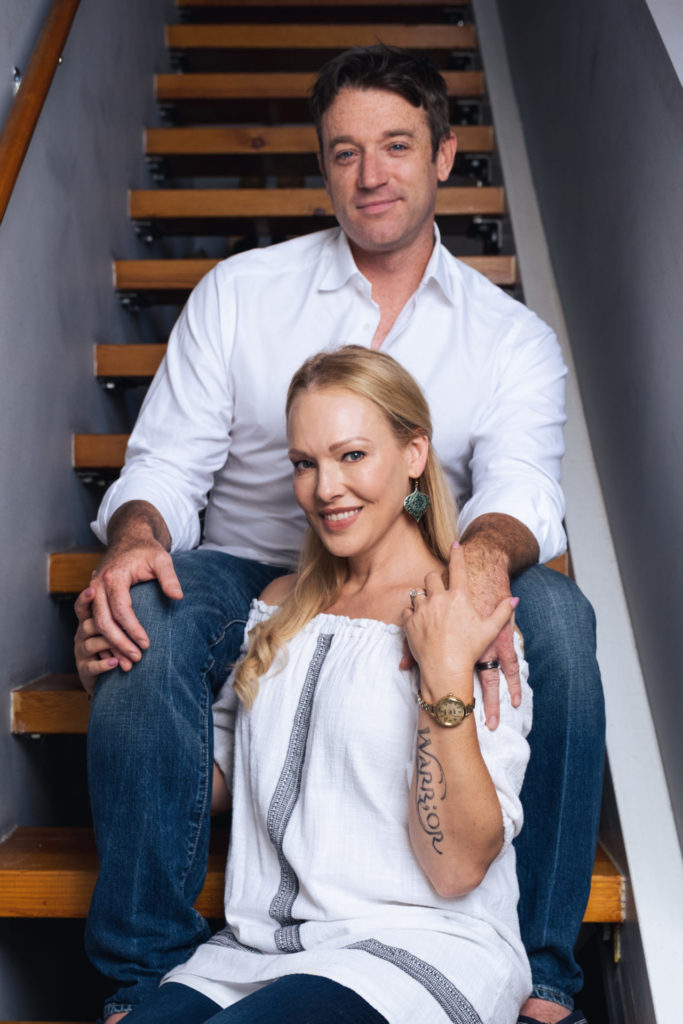
“The idea of somebody being cancer-free is to ignore the cancer that we live with on a day to day basis, which is the psychological cancer of going through that type of trauma.” (Erin)

